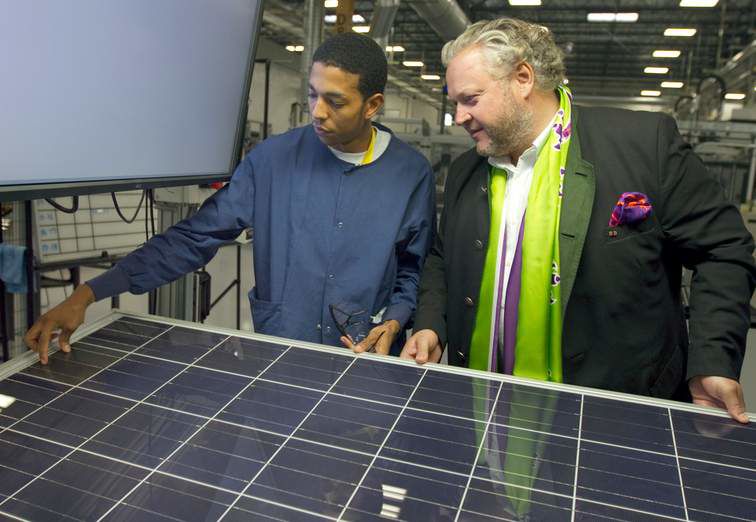CEO of SolarWorld sees bright future in U.S. market
Published 5:00 am Friday, October 29, 2010

- SolarWorld CEO Frank Asbeck, right, talks with Willie Peters, 20, a production technician in the company's Hillsboro plant last week. The plant opened an expansion of its solar panel operation in September and is now producing finished panels.
PORTLAND — When Frank Asbeck’s 12-year-old daughter Carolin hit the inevitable stage of finding her father embarrassing, the German businessman administered shock therapy.
Asbeck, the big, brash chief executive of Bonn-based SolarWorld, donned a Scottish kilt to pick her up at school. “Hi, sugar!” he called, waving to his mortified tween.
Trending
The stunt was vintage Asbeck, a swashbuckling entrepreneur who in a decade since taking SolarWorld public has led the cell and panel maker to $1.4 billion in annual sales.
At 50, Germany’s Sun King shows no signs of slowing, judging by his whirlwind visit last week to the company’s Hillsboro factory. The plant, with nearly 1,000 employees, has grown in two years to become one of Oregon’s largest manufacturers.
Asbeck, a celebrity of sorts in Europe, is just breaking into the U.S. business scene, where he’s poised to become a force as solar takes off. He speaks his mind publicly, unlike buttoned-down German execs stationed in Portland.
Take his pet peeve, the challenge of competing with heavily subsidized Chinese manufacturers. “How can you produce anything in the U.S.,” he asks, “as long as Chinese are paid like donkeys?”
$500M investment
Asbeck’s company is manufacturing full-tilt in Oregon, having invested more than $500 million in a factory it acquired in 2007. He predicts America will leapfrog Spain and Japan within 15 months to become the world’s second-biggest solar market behind Germany.
Trending
Asbeck is gambling on U.S. workers, automation and perhaps most of all, timing. He figures the American solar-panel market is about to blast off, driven by price reductions, government incentives and the end of cheap oil.
“You’re God’s country, a really sunny country,” he says. “You can produce energy very feasibly.”
Asbeck, a stocky, bearded 6-footer, showed up last week at The Nines hotel in Portland for an interview, his first with a U.S. journalist. He wore jeans, a sport coat and a bright green scarf. A SolarWorld staff member ushered him toward the Library, a dark, wood-paneled room reserved for the occasion.
Asbeck glanced at black leather couches and a pool table. “No,” he said, waving dismissively, “let’s sit in the sun.” Before choosing a seat in the sunlit atrium, he ducked into the restaurant where one of his two sons, Nicolas, 14, was eating breakfast. “Hey,” Asbeck said, “you can play pool in there if you want.”
Asbeck spoke briefly about his background.
He got his university degree in agricultural engineering, writing a thesis on trout production. He decided not to become a scientist after concluding that only one-quarter of academic knowledge is applied in the real world.
After college, Asbeck rode a motorcycle through Africa, settling in Nigeria, where he started businesses repairing and selling machinery, and processing palm-kernel oil for soap. Later in Peru, he sold Mercedes tractors.
In 1998, Asbeck started the Bonn-based solar-engineering company that would become SolarWorld; it went public the next year. SolarWorld bought Bayer’s solar subsidiary in 2000 and the factories of Shell Solar — formerly Siemens Solar and Arco Solar — in 2006.
Today SolarWorld is vertically integrated, meaning company divisions are involved in every step — from refining polysilicon raw material to growing silicon crystal to manufacturing wafers, cells and panels, to selling solar systems. The company, with about 3,300 employees, has factories in Hillsboro; Camarillo, Calif.; and Freiberg, Germany; as well as joint ventures in Qatar and South Korea.
The Sunday Times listed Asbeck as 60th on its list of wealthy greenies last year. The Times pegged his assets at $694 million, a figure the London newspaper said was twice as high until recent stock market declines.
A ‘green thinker’
The maverick executive uses a smart phone to monitor company finances. He receives daily reports he says show U.S. sales increasing more than 40 percent compared to last year.
SolarWorld’s vision statement includes a goal of helping to avoid military conflicts by increasing independence from fossil fuels. Asked whether the company’s ideology tacks left of most corporations, Asbeck appeared puz- zled.
“We don’t think left or right,” he said. “It’s sustainable, green thinking.”
Asbeck said SolarWorld customers are willing to pay a premium of 10 to 15 percent because, he said, his company’s products have superior quality.
Asbeck said he likes solar energy because it’s a “democratic” form of energy that anyone can generate. He said he travels often with German Chancellor Angela Merkel, and has seen villages in developing countries that leapfrog conventional energy and telephone service to adopt wireless technology.
The United States is now the market for solar, Asbeck said. He predicts annual U.S. module sales will reach 2 gigawatts of capacity — enough to power 400,000 homes — by the end of next year, up from 441 megawatts last year. But he said local government incentives remain varied, confusing and subject to change.
The U.S. market could benefit, he said, from a national feed-in tariff system, in which homeowners with solar panels would be paid — as in European countries — for energy they generate beyond what they use.
Oregon recently launched a pilot program along those lines, but federal regulations prevent homeowners from selling excess energy to utilities.








